Operation Iron Swords - Day 230 - 23 May 2024
“At any point, Hamas could have ended this burgeoning tragedy to
surrender and release every hostage. …
Hamas instigated and owns this humanitarian catastrophe.”
Sen. John Fetterman (D-PA)
Contents |
|
NEW - War Termination NEW - Operations NEW - Operations - Gaza NEW - Operations - Judea-Samaria NEW - Operations - Lebanon NEW - Operations - Syria / Iraq NEW - Operations - Yemen UPDATED - Operations Maps NEW - By-Standers NEW - Axis of Resistance NEW - Allied for Democracy UPDATED - By the Numbers |
"Daniela, Karina, Liri, Agam and Naama, we are committed to returning you home," stated the IDF spokesman, Brigadier General Daniel Hagari, "this video is a reminder of the moral duty, the moral imperative, to return you, along with the one hundred and twenty-three abductees, as soon as possible".
The families of the female soldiers express their hope that the footage will increase pressure on Prime Minister Benjamin Netanyahu to agree to a truce with Hamas and secure the release of the hostages. The government saw the publication of the three-minute clip in local and international media as an opportunity to rally support. While Hamas defended the behavior of its gunmen and described the video as an attempt to manipulate public opinion.
Israeli television broadcast previously withheld footage of five female army recruits wearing pajamas being kidnapped by Hamas gunmen during the October 7 attack. Government spokesman David Mincer told reporters, "These girls are still in Hamas captivity. Please do not look away. Watch the footage. Support Israel in recovering our citizens (hostages)."
The Hostage Families Forum, which represents relatives of 124 people, most of them civilians, who are still being held by Hamas, said that the footage was obtained from cameras installed on the bodies of the gunmen who attacked the Nahal Oz base in southern Israel, where female soldiers were working in surveillance and reconnaissance. The forum added that footage of dead Israeli soldiers was excluded and that the families of female soldiers agreed to publish footage of their detention. The forum said: "The Israeli government must not waste another moment. It must return to the negotiating table today."
The Israeli army indicates that this video was captured by cameras worn by Hamas militants, security cameras, and mobile phones, according to a report published by the Wall Street Journal. In an interview with Al-Hurra TV on Thursday, Israeli army spokesman Daniel Hagari called on Egypt and Qatar to “pressure” the Hamas movement to release the kidnapped women, especially the women and children, pointing to what he described as the “brutal treatment” of the kidnapped women, after it was published. Israeli army video clip.
He explained: "We found the video inside a computer in Al-Shifa Hospital. The rest of the clip (it is about two hours long) cannot be shown because it contains disgraceful and brutal footage, out of respect for the female soldiers."
Hamas denounced the “manipulation” of the video, stressing that there was “deliberate cutting and cutting of the scenes and the selection of images and clips to support the occupation’s allegations and lies of attacking female soldiers,” and “distorting the image of our people’s resistance.” The statement added, "The presence of small traces of blood or minor injuries to some of the female soldiers is something to be expected in such operations, and the stampede that may be marred by them, and the scenes did not show any physical assault on any of them."
The Israeli War Council announced that it had unanimously approved new guidelines for negotiators in an attempt to revive talks on a hostage-for-truce deal with Hamas in the Gaza Strip. The video of kidnapped female soldiers in Gaza prompted the Israeli War Council to reopen the door to indirect negotiations with Hamas. Israeli television broadcast previously blocked footage of five female army recruits who were wearing their pajamas while being detained by Hamas militants during the October 7 attack that was followed by the Gaza war. The War Council agreed to resume indirect talks with Hamas to release the hostages, and a source told Israeli media that “the negotiating team was handed guidelines to try to achieve an elusive breakthrough,” according to the Times of Israel.
A statement from the office of Prime Minister Benjamin Netanyahu said that the war council ordered the negotiating team “to continue negotiations for the return of the hostages.” Gen. Nestan Alon, one of the Israeli negotiators, presented an “updated” plan after Netanyahu rejected an earlier proposal on Saturday, the Kan public broadcaster reported, the newspaper reported. Kan quoted a source as saying that the negotiating team “did not get everything they asked for, but at least progress can be made” in the negotiations.
Axios quoted American and Israeli officials as saying that the director of the CIA, Williams Burns, will soon travel to Europe to meet with the head of the Israeli intelligence service, Mossad, David Barnea, in an attempt to revive... Hostage release talks in Gaza. It is not yet clear when or under what terms new negotiations might take place.
The Kan report indicates that one of the points in the new proposal for negotiations is “reaching a compromise on a controversial issue with Hamas,” but with “tightening the Israeli position on other issues” it is still pending.
Israeli Army Chief of Staff Herzi Halevy stated during a war cabinet session that “the need has become urgent” to reach an agreement with the Hamas movement that would lead to the release of Israeli prisoners in the Gaza Strip. The political correspondent for the Israeli Walla website quoted two informed sources on Thursday that Halevy said during the meeting that took place yesterday, Wednesday: “The Israeli army is exercising military pressure on Hamas, especially through the operation in Rafah, but this must be accompanied by a political process to release Hamas.” "Hostages."
The report stated that all heads and leaders of the security services, including the negotiating team, expressed a unified position during the cabinet meeting and stressed “the necessity of moving urgently to reach an agreement to release the hostages, even if that comes at the price of being willing to discuss the latest proposal agreed to by Hamas and making more concessions.” The website reported, quoting an Israeli official, that Prime Minister Benjamin Netanyahu and the ministers members of the war government decided to expand the powers of the negotiating delegation. However, he explained that “it is not certain that it will be possible to achieve a breakthrough in the talks on the hostage deal.”
Haaretz newspaper reported, citing informed sources, that “the decisions taken by the war cabinet last night are not sufficient to bridge the gap between Israel and Hamas and reach an agreement,” and reported that “the negotiating delegation obtained agreement to show certain flexibility based on Israel’s proposal.” Earlier today, Reuters quoted two informed sources as saying, “Egypt remains committed to helping negotiate a ceasefire agreement and the release of hostages held in the Gaza Strip despite skepticism about its mediation efforts.” They added that “Cairo is in contact.” In Israel to set a date for a new round of talks.
Egypt, Qatar, and the United States have been trying, during intermittent talks that have been ongoing for months, to reach an interim agreement between Israel and Hamas that would lead to a truce in Gaza and the gradual release of Israeli prisoners held in the Strip. The two sources said that the Egyptian mediators received phone calls from Israeli security officials on Wednesday and Thursday, in which they thanked Cairo for its role. During the contacts, the Egyptians expressed their desire to complete negotiations on Gaza, and agreed to set a date for the talks.
On the other hand, a high-ranking Egyptian official said, in statements reported by Cairo News Channel, that Israel “is still not qualified to conclude a deal regarding a ceasefire in the Gaza Strip and the release of hostages,” without explaining the reasons. Yesterday, Wednesday, Egypt threatened to withdraw from the mediation role in light of the tension resulting from the faltering latest round of talks and the Israeli military incursion into the city of Rafah in the southern Gaza Strip.
During intermittent talks that have been ongoing for months, Egypt, Qatar and the United States have been trying to reach an interim agreement between Israel and Hamas that would lead to a truce in Gaza and the gradual release of Israeli hostages held in the Strip. Egypt threatened to withdraw from the mediation role in light of tension related to the faltering of the latest round of talks and the Israeli military incursion into the city of Rafah in the southern Gaza Strip. Two Egyptian security sources said on Thursday that Egypt remains committed to helping negotiate a ceasefire agreement and the release of hostages held in the Gaza Strip despite skepticism about its mediation efforts. They added that Cairo is in contact with Israel to set a date for a new round of talks, according to Reuters.
The two sources said that the Egyptian mediators received phone calls from Israeli security officials in which they thanked Cairo for its role. During the contacts, the Egyptians expressed their desire to complete negotiations on Gaza, and agreed to set a date for the talks. CNN reported on Tuesday, citing three sources familiar with the negotiations, that Egyptian intelligence changed the terms of a ceasefire proposal that Israel agreed to earlier in May. According to the report, when Hamas announced, on May 6, that it had accepted the agreement, it was not the proposal that mediators from the United States and Qatar thought was presented to Hamas.
CNN added in the report that the changes introduced by Egyptian intelligence caused anger and an exchange of accusations between American, Israeli and Qatari officials and caused a crisis in the talks. Tensions are escalating between Egypt and Israel due to the Israeli military operation in Rafah, south of the Gaza Strip, on the opposite side of the Egyptian border.
A high-ranking Egyptian source confirmed that the Israeli position is still not qualified to reach a deal regarding a ceasefire in Gaza and the exchange of prisoners with the Hamas movement. According to Cairo News Channel, earlier yesterday, a high-ranking source expressed Egypt's astonishment at the attempts of some parties to deliberately insult the Egyptian efforts made to reach a ceasefire in the Gaza Strip. The source added, in exclusive statements to Cairo News, that "some parties are playing the game of accusing the mediators of successive accusations, accusing them of bias and blaming them for evading making the required decisions."
In the same context, the Times of Israel newspaper confirmed on Thursday that the War Council ordered the negotiating team to resume work on a deal to release dozens of prisoners held by Hamas and other armed Palestinian factions inside the Gaza Strip. The newspaper reported that the office of Israeli Prime Minister Benjamin Netanyahu issued a statement following a meeting of the war council that was formed in the wake of the attack on October 7, in which he said that a “high-level meeting” ordered Israeli negotiators to work on continuing negotiations to return the prisoners.
Indirect negotiation rounds hosted by Cairo failed to reach a ceasefire agreement in the Gaza Strip and the release of prisoners, including military personnel. The war in the Gaza Strip did not stop for only seven days since it broke out on October 7, when Egypt, Qatar and the United States succeeded in concluding a series of truces under which the two fighting parties exchanged a number of prisoners and the fighting stopped for seven days.
The Hebrew newspaper "Haaretz" quoted an unnamed source as saying that last night's meeting was long, deep and professional. The source added that the ministers discussed proposals from the negotiating team with the aim of resuming negotiations with Hamas and discussing its demand for a complete cessation of hostilities in the Gaza Strip, despite the political leadership’s opposition to this agreement. The sources also reported that the ministers in the War Council took decisions aimed at giving the negotiators more room to maneuver.
Israeli army spokesman Daniel Hagari said in an interview with Al-Hurra TV that Egypt is “an important country for Israel,” pointing out that his country is “working to ensure that the complex operation in Rafah does not push civilians to head toward Egypt’s borders.” Hagari added: "Rafah is a complicated city because Hamas is using civilians there, and the region is complicated because it is near the Egyptian border, and Egypt is an important country for us and mediates in hostage negotiations." He continued: "We must ensure that we are working against Hamas in Rafah and do not see the people of Gaza heading towards Egypt because of Hamas. We must ensure that innocent civilians in Gaza will go to Al-Mawasi and other safe areas that we have prepared for them."
This comes at a time when relations between the two countries have been tense since the start of the military operation in Rafah and Israel's control of the border crossing between Gaza and Egypt. The Philadelphia axis is considered a “buffer zone” and is subject to the peace agreement between Egypt and Israel, but two weeks after the Israeli military operation in the city of Rafah on the Egyptian border, the Israeli army took control of “half of the axis,” according to its assurances to the “Al-Hurra” website, which raised questions about the reasons and repercussions. That step.
A high-ranking source told Cairo News Channel on Tuesday that “Egypt’s respect for its international obligations and treaties does not prevent it from using all available scenarios to preserve its national security and preserve the historical rights of the Palestinian people.” Cairo says that the attack on Rafah prevents the use of the Rafah crossing to deliver much-needed humanitarian aid to Gaza, while Israeli Prime Minister Benjamin Netanyahu said that Egypt is holding Gazans “hostage” because of its refusal to cooperate with Israel regarding the Rafah land crossing.
On May 7, the Israeli army took control of the Palestinian side of the Rafah border crossing with Egypt, despite widespread international opposition to this. Regarding the military operation in Rafah, he considered that the city “is controlled by Hamas and is holding hostages there and carrying out terrorist operations,” adding: “The Arab world must help us to ensure that Hamas will not exist, not only within our borders but in any other country.”
The Israeli spokesman said that the army forces killed “more than 100 terrorists in Rafah, and found tunnels and weapons stores,” adding: “We are fighting in Rafah and we are trying to be precise to reduce the number of civilian casualties, and because of the presence of (Hamas) kidnappers.”
Hagari stressed, "It is not possible to specify a specific time to end the operations, but we will end with the elimination of Hamas."
The fighters of the combat teams of the 98th Division and special forces from the Air Force and the Yalam unit eliminated in an underground space the terrorist Hasin Payach, the commander of the Beit Hanun battalion of the Hamas terrorist organization. Fiach was responsible for many anti-tank missiles that were launched into the territory of the State of Israel during the war, as well as for launching many rocket launchers towards the settlements in the north of the Otaf. The elimination of Fiach is part of the 98th Division's combat effort above and below ground, to find and destroy a tunnel route and eliminate the terrorists hiding inside.
The Givati TDF, operating under Division 162, are fighting in East Rafah and eliminating terrorists in face-to-face battles. This week, during an activity of the force, the fighters encountered a number of terrorists who came out of a tunnel shaft and shot at the forces, the forces fired back at them and eliminated them. Air Force aircraft killed three terrorists in a mortar squad who fired rockets at Israeli forces in the Rafah area.
The forces of Division 162 continue to act precisely following information about terrorist targets in the area of the 'Brazil' neighborhood and the 'Shabora' area in Rafah, while preventing as much as possible harm to the civilian population and after the civilians have evacuated the area. Fighters of the 401st Brigade Combat Team located a rocket launcher ready to launch at Israeli forces. The combat teams of the Nahal and Givati brigades are working in the area, the forces located and destroyed a number of shafts in the area, launchers, and eliminated a number of terrorists in face-to-face encounters.
The forces of the 98th Division continue their operation in the heart of Jabalia. In cooperation with the Air Force, they attacked and killed a number of Hamas terrorists in an attack on a number of military buildings that were used to store ammunition. The combat teams of the 7th Brigade and paratroopers located many weapons, including Kalashnikov-type weapons, explosives, grenades, sniper weapons, cartridges and combat equipment.
The forces of Division 99 continue to operate in the area of the corridor in the center of the Gaza Strip. In the last day, the Air Force forces, in cooperation with the fire brigade of the division, carried out several attacks, among them, the head of squad six in a hiding apartment, the elimination of two terrorists who fired at our forces and the elimination of a terrorist who infiltrated our territory on 7.10. The combat team fighters of the 679th Brigade continue their operation in the center of the Gaza Strip and during the last day they identified several terrorist squads, among them a squad with military equipment that entered a building, directed an Air Force aircraft that eliminated the terrorists.
The Netzah Yehuda Battalion, under the command of the Northern Brigade, began in recent days a targeted raid in the Beit Hanon area to eliminate terrorists, locate and destroy terrorist infrastructure as well as underground infrastructure. During the activity in the area yesterday (Wednesday), three IDF soldiers were killed whose names were allowed to be published, the IDF shares in the grief of the families and will continue to accompany them. The forces continue fighting in the area and in cooperation with the Air Force forces attacked many terrorist targets, among them, an anti-tank position, a military structure and sniper positions.
Also, the soldiers of the 414th Battalion identified a terrorist shooting at the forces in a building near the forces, an Air Force aircraft and a tank eliminated the terrorist after the identification. Immediately after, another terrorist was spotted shooting at the troops from the same building, the forces directed a fighter jet that destroyed the building and eliminated the terrorist.
Operational Update - Judea-Samaria
Following the announcement by 3 European countries that they would officially recognize the "State of Palestine", Israel announced the cancellation of the law of disengagement from the northern West Bank, allowing Israelis to return to 3 former settlements that they were prohibited from entering, as well as threatening to stop Israeli banks from dealing with their Palestinian counterparts. According to a statement issued by the Ministry of Defense on Wednesday, Israel decided to cancel the law of disengagement from the northern West Bank, which dates back to 2005, as it announced the army’s approval to allow Israelis to return to 3 former settlements in the West Bank that they had been prohibited from entering since an order to evacuate them was issued before.
Obtaining permission from the army, which fully controls the West Bank, was required for any return to the three former settlements, namely Sanur, Ganim and Kadim, near the Palestinian cities of Jenin and Nablus, which are strongholds of armed factions in the northern West Bank, according to Reuters.
In addition, the Israeli Minister of Finance, Bezalel Smotrich, indicated the possibility of canceling the exemption, which expires on July 1, and allowed Israeli banks to deal with payments in shekels for services and salaries linked to the Palestinian Authority, which prompted the US Treasury Secretary, Janet Yellen, on Thursday, to express In a statement expressing its concern that this step would lead to the closure of a vital artery that feeds the Palestinian economy.
Israel announced the cancellation of the law of disengagement from the northern West Bank, allowing Israelis to return to 3 former settlements that they were prohibited from entering, as well as threatening to stop Israeli banks from dealing with their Palestinian counterparts.
Professor of Public International Law, Ayman Salama, considers that Israel's "retaliatory" measures mean that it is "reneging on its obligations in line with international law and the Fourth Geneva Convention, as well as the agreements signed with the Palestinian Authority in Oslo 30 years ago." He says to the Al-Hurra website that “settlements and settlement operations are illegal,” and that “the Fourth Geneva Convention of 1949, the Hague Regulations of 1907, and international humanitarian law oblige Israel to take all guaranteeing measures to protect the rights of civilians in the West Bank, including taking all measures to protect the rights of civilians in the West Bank.” measures within its power to restore and ensure public order and public safety as an occupying state.”
In turn, Palestinian political analyst, Ashraf Akka, considers the Israeli measures tantamount to "a declaration of war against the Palestinian Authority in the West Bank." He told Al-Hurra website that these decisions may “explode” the situation because they have political dimensions that undermine the idea of ??a two-state solution, and “aim to destroy the Palestinian Authority, by defying UN Security Council Resolution No. 2334, which calls for freezing all settlement activities.” Akka adds: “The current events in the West Bank, including through military operations carried out by Israeli forces in the city and Jenin camp, aim to confuse and weaken the Palestinian Authority and embarrass the leadership.”
On the other hand, Israeli political analyst, Mordechai Kedar, says that his country took such steps to protect the rights of its citizens, “after the Palestinian Authority did not adhere to what was stated in the Oslo Accords.” He added in a phone call with the Al-Hurra website, “Israel evacuated the settlements in 2005, hoping that the Palestinian Authority would adhere to the peace agreements that were signed in the 1990s, which prevented it from acting in international forums unilaterally without referring to Israel.” But according to Kedar, “the Palestinian Authority sought to violate the agreements and eliminated the presence of Israel from the map over the years,” so the government had “no choice but to return the citizens to the settlements,” and implement the repeal of the disengagement law, which the Knesset (Parliament) had already repealed more than From a year ago.
According to the Israeli " i24 News " channel website , the Knesset repealed the Disengagement Law of 2005, in March 2023, which was the law that canceled the right of the Israeli presence in the evacuated settlements in the West Bank.
In 1993, Israel and the Palestine Liberation Organization signed the Oslo Accords, sponsored by the United States of America, according to which the Palestinian Authority recognized the State of Israel, in exchange for Israel’s recognition of the PLO as the representative of the Palestinian people. The historic Oslo Accords created limited Palestinian self-rule under the name “Palestinian Authority,” based in Ramallah, with the ultimate goal of establishing a Palestinian state whose people live in freedom and peace alongside Israel. However, little progress has been made, according to Agence France-Presse, as the expansion of Israeli settlements has presented major obstacles since the signing of the agreement, the most recent of which was last March, when the West Bank witnessed the largest land confiscation process by Israel since the signing of the agreements, after the Minister of Finance issued, A decision to consider 800 hectares in the West Bank “state land.”
At the end of an operation that lasted 40 hours in Jenin, in the Menashe Brigade, in which hundreds of fighters from the Harob Patrol forces, Dovdevan, undercover, MGB fighters and Shin Bet forces took part, hit dozens of terrorists. The fighters destroyed terrorist infrastructure and exposed shafts from explosives that were planted and were intended to hit the troops. In addition, a cargo laboratory was located and a large amount of military equipment and ammunition was confiscated.
The Chief of Staff, Lt.Gen. Herzi Halevi, held a situation assessment in the Jenin region yesterday (Wed) and spoke with the forces participating in the countermeasures operation in the city. In addition, there is a tour of the seam line in the Menashe division. The Deputy Chief of Staff, Colonel Amir Baram, Commander of the Central Command, Colonel Yehuda Fox, Head of the Multi-armed Force Planning and Building Division, Colonel Eyal Harel, Commander of the IOS Division, Lieutenant Colonel Yaki Dolf and other commanders participated in the visit.
"The course of countermeasures all the time, and going to the difficult places, and realizing that there is no place that is a safe haven," Chief of Staff Halevi, "we will reach every Slick and every home, both in the heart of the MP, and in hospitals, and wherever they are Terrorists, we will know how to initiate and arrive and attack before they reach us. So that a permanent infrastructure does not develop here, so that capabilities do not advance here."
"I say this to you with great respect," the Chief of Staff continued, "we have excellent people in all departments, who work with dedication, talent, responsibility, and professionalism, and these things bring very good results, and this is a necessary condition for us going forward, that your young subordinates who are also learning and accumulating Here is experience, they will go forward with us and develop into commanders."
In the midst of the IDF and Shin Bet operation in Jenin, in the Menashe Brigade, an armed terrorist squad was spotted shooting at the troops by ambush fighters of the 636 Battalion. Guided from the air by a drone operator from the unit, the fighters of the Haruv Patrol began a pursuit of the terrorist squad that fled to a hospital in the area to hide. The fighters followed the terrorists' route and managed to locate the vehicles in a parking lot next to the hospital, the terrorists hid their weapons in the vehicle and fled on foot into the hospital compound. The fighters broke into the vehicles and found six weapons and ammunition that were used by the terrorists.
Israeli Prime Minister Benjamin Netanyahu confirmed, during a visit to the army’s Northern Command headquarters, that Israel has “detailed, important, and even surprising plans” to deal with the Lebanese Hezbollah organization. Netanyahu said: “I will not share these plans with the enemy,” adding that the plans have two goals - restoring security in the north and allowing civilians to return to their homes. He noted after the visit, which was also attended by the commander of the Northern Command and the 91st, 36th and 146th divisions, that “we are determined to achieve both things together.”
Battles in southern Lebanon between Hezbollah on the one hand and the Israeli army on the other have been continuing for more than 7 months, and operations are expanding on a daily basis along the southern border from Ras Naqoura to Shebaa Farms. Israeli Defense Minister Yoav Galant recently announced that half of Hezbollah's military leaders in southern Lebanon had been eliminated, stressing that the coming period "will be decisive."
On Thursday, the Lebanese Hezbollah announced a retaliatory strike in response to the assassination of fighter in its ranks Muhammad Ali Nasser Faran and the wounding of child students on Thursday by Israeli bombing, by launching dozens of missiles at two military bases. An Israeli march targeted a car on the Kfardjal-Nabatieh road in southern Lebanon, killing its driver and wounding 3 students who were inside a school van heading to their school. Meanwhile, the Israeli army confirmed today that it had assassinated Muhammad Ali Nasser Faran, who was responsible for manufacturing weapons in Hezbollah.
Fighter jets attacked a series of Hezbollah targets in southern Lebanon. Among the targets that were attacked, Hizbollah military buildings in the areas of Eyta al-Sha'ab Rav al-Taltin and Merkaba, a military building and two observation posts of the organization in the al-Adaisa area in southern Lebanon. Following the alerts that were activated in the north of the country about the infiltration of hostile aircraft, two unmanned aircraft were detected that crossed over Lebanese territory, Air Force fighter jets successfully intercepted one aircraft, another aircraft fell in the Kiryat Shmona area, there were no casualties.
An Air Force aircraft attacked and killed the terrorist Muhammad Ali Nasser Fran, who is responsible for an infrastructure for the production and equipping of Hezbollah's weapons in southern Lebanon. In recent years, the terrorist Nasser Fran has been engaged in the production of strategic and unique weapons for Hezbollah, and some of the infrastructures he was responsible for in southern Lebanon have been attacked during the past months. Its thwarting is part of the activities of the IDF and the security forces to damage the strengthening of the Hezbollah terrorist organization with weapons and means of warfare intended to harm the Israeli home front.
Following the latest warnings in the Upper Galilee, about thirty launches were detected that crossed the territory of Lebanon. Some were intercepted, the rest fell in open areas, no casualties. In a quick circuit, an aircraft attacked the launcher that carried out the launches to the Upper Galilee. Further to the alerts that were activated a short time ago in the north of the country about the intrusion of a hostile aircraft, this is a false identification.
Lebanese Hezbollah responded to the assassination of fighter in its ranks, Muhammad Ali Nasser Farran, and the wounding of child students today, Thursday, by Israeli bombing, by launching dozens of missiles at two military bases. Lebanese "Hezbollah" showed scenes from its attack on the Israeli army's Metulla site on the southern Lebanese border. In the video: Fires broke out between the settlements of Kiryat Shmona and Beit Hillel following the fall of missiles launched from Lebanon. Hezbollah's military media published a video clip showing "scenes from the operation targeting the Islamic Resistance, the Metulla site of the Israeli enemy army, on the Lebanese-Palestinian border." It said in a statement about this operation: “In support of our steadfast Palestinian people in the Gaza Strip and in support of their valiant and honorable resistance, the Mujahideen of the Islamic Resistance targeted, at 12:30 noon today, Thursday, May 23, 2024, the spy equipment at the Metula site with appropriate weapons and were a direct hit."
The military media of the Islamic Resistance in Lebanon announced that, “In support of our steadfast Palestinian people in the Gaza Strip and in support of their valiant and honorable resistance, and as part of the response to the assassination carried out by the enemy in Kafr Djal, the Mujahideen of the Islamic Resistance bombed the new headquarters of the 91st Division at the Illit base with dozens of Katyusha rockets.
US Presidential Energy Advisor Amos Hochstein recent proposal “converting the Blue Line into a border line” between Lebanon and Palestine simply means the annexation of more Lebanese territory within a context that has continued since the Sykes-Picot Agreement all the way to the Blue Line. The Sykes-Picot Agreement laid the foundations for dividing the Arab region, or what was known as the Fertile Crescent, into areas of influence between Britain and France. However, Lebanon's borders with Palestine continued to shrink at Lebanon's expense after it passed through three main historical stages: the Boulet-New Camp Agreement, the Armistice Agreement, and the demarcation of the Blue Line in 2000.
Operational Update - Syria / Iraq
Air Force fighter jets successfully intercepted two suspicious aerial targets that made their way from the eastern region towards the city of Eilat. The targets did not cross into the country and no warnings were activated according to policy.
A statement of the Islamic Resistance factions in Iraq said: “In continuation of our approach to resisting the occupation and supporting our people in Gaza, and in response to the massacres committed by the usurping entity against Palestinian civilians, including children, women and the elderly, the Mujahideen of the Islamic Resistance in Iraq targeted vital targets in our occupied territories at dawn today, Thursday.” In the port of Haifa, using advanced Al-Arqab cruise missiles, the Islamic Resistance confirms that it will continue to destroy enemy strongholds.” The Iraqi resistance published, via the Telegram application, “a video of the moment the rockets were launched.”
The head of the Yemeni national delegation, the negotiator - the official spokesman for Ansar Allah - Muhammad Abdul Salam, represented Yemen at a meeting of leaders in the axis of jihad and resistance in the Iranian capital, Tehran, on the sidelines of the funeral of the Iranian president and his companions. The resistance factions met with the Commander-in-Chief of the Islamic Revolutionary Guard Corps, Major General Hossein Salami, and the Commander of the Quds Force, Ismail Qaani, in the capital, Tehran. During this meeting, the latest political, social and military situation in Gaza, the “Al-Aqsa Flood” operation, and the role of the resistance front were discussed. The participants stressed the continuation of jihad and struggle until complete victory for the Palestinian resistance in Gaza is achieved, with the participation of all factions and resistance fronts.
Maps
|
All maps are lies. “Not only is it easy to lie with maps, it is essential,” wrote cartographer Mark Monmoneir in his book How to Lie with Maps. He showed that condensing complex, three-dimensional spaces onto a two-dimensional sheet of paper [in old days] is bound to be reductive. But it is impossible to comprehend the war in Gaza without reference to maps, otherwise the entire conflict is reduced to an endless series of meaningless acts of random violence and the suffering of civilians. The first characteristic of guerrilla warfare is the loss of a front line. Evidently, different mappers have different ideas of how to depict the war in Gaza, notably those that seek to depict Israeli progress in the ground campaign. Part of the problem is latency. The news that forms the basis of the maps takes time to filter out to mappers, and the cartographers take time in crafting their maps, and it takes time to curate them. These processes are uneven among mappers, so their maps may differ in detail. Probably there is some ideological bias, or at least thematic apperception, which is understandable in wartime. It may come as no surprise that al-Jazeera maps depict rather less Israeli territorial progress than other sources. Finally, there remains the epistemological question of just exactly what are the colored in areas depicting. Naively, this might be understood as areas of Israeli control, that are no longer contested by the HAMAS. Or possibly these are areas of Israeli presence, in many of which the possibility of an RPG-wielding HAMAS militant popping out of a tunnel unexpectedly remains a live possibility. With the "zero-range" combat characterized by small unit tactics on both sides, maps may be prey to a fallacy of misplaced concreteness.
|
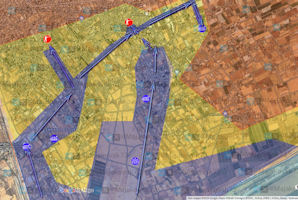
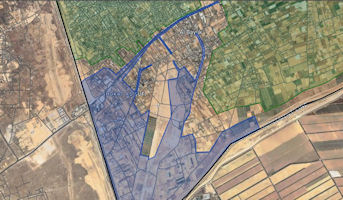
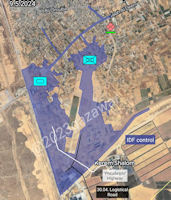
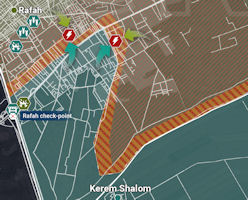
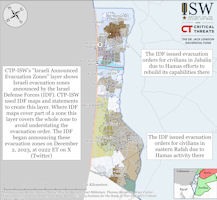
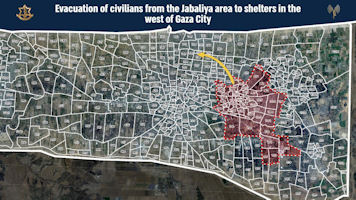
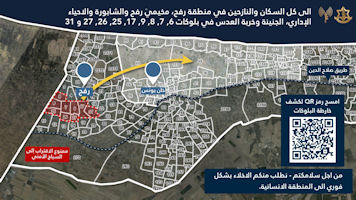
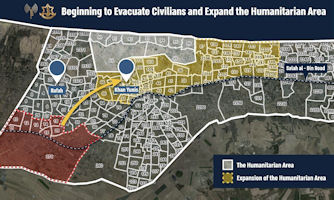
Bystanders
Axis of Resistance
The representatives of the region’s anti-Israeli resistance groups held a meeting in Tehran, attended by senior commanders of the Islamic Revolution Guards Corps (IRGC). A number of officials representing the resistance groups assembled in Tehran on the sidelines of a formal ceremony held to pay tribute to late Iranian President Ebrahim Raisi and his entourage, who died in a helicopter crash on May 19. The high-profile gathering of resistance groups was participated by IRGC Commander Major General Hossein Salami and Commander of the IRGC Quds Force Brigadier General Esmaeil Qaani.
Tasnim has obtained information about the topics discussed in the meeting, which revolved around the latest political, social and military developments in Gaza, the Al-Aqsa Storm operation against the Israeli regime, and the role of the resistance front in the region. The attendees at the meeting emphasized the need for the continuation of the fight and struggle until the Palestinian resistance’s complete and ultimate victory in the Gaza Strip with the participation of all resistance groups and fronts across the region.
Acting Foreign Minister Ali Bagheri said that the resistance not only humiliated the Zionist entity in the field, but also made it suffer the bitterness of an unprecedented defeat over the past 75 years at the political, legal and public diplomacy levels. This came during Baqiri’s meeting with the leaders of the Palestinian resistance groups , namely Ismail Haniyeh, head of the political bureau of the Islamic Resistance Movement ( Hamas ), Muhammad al-Hindi, assistant secretary-general of the Islamic Jihad movement in Palestine, and Jamil Mezher, assistant secretary-general of the Popular Front for the Liberation of Palestine, accompanied by a number of members of these three factions. , who are visiting Tehran to participate in the memorial ceremony of the martyr President Ayatollah Ebrahim Raisi and the martyr Foreign Minister Hossein Amir Abdollahian and their martyred companions.
In the meeting, the leaders of the Palestinian resistance saluted the memory of the martyr Amir Abdullahian and pointed out his interest and special activity in defending the rights of the Palestinian people in regional and international meetings and conferences. They evaluated the importance of the efforts of the martyr Amir Abdullahian in establishing bridges of communication with Arab and Islamic countries.
As for the Acting Foreign Minister, Ali Baqeri, he praised the courageous resistance of the Palestinian people in confronting the Zionist entity . He stressed that resistance is not a slogan or a tactic, but rather an issue based on real components. Therefore, during the aggression launched by the invaders armed with the latest and most lethal weapons against the oppressed and powerful in Gaza, it was the Palestinian people who raised the banner of pride, independence and power. Baqeri referred to the direction and principled efforts of Ayatollah Raisi and Amir Abdullahian in supporting the just rights of the Palestinian people and the resistance, saying that the Islamic Republic of Iran will make every effort to defend the oppressed Palestinian people and the legitimate resistance against the Zionist occupation and stop the crimes of the Zionist entity against the oppressed Palestinian people.
Allied for Democracy
The Washington Post reported that in the seven months since the Hamas attack on October 7 and the Israeli military response in Gaza, American opinions have varied in equal intensity. The American newspaper referred to a poll conducted by YouGov, a research company, for Yahoo News, which reflects Americans' opinions about the parties to the conflict and the US administration's response to it. The poll revealed that Americans were almost equal in saying that President Joe Biden's response to the conflict was good, that it was not supportive of Israel enough, or that it was too supportive of Israel. Additionally, some of them, to the same extent, said that they were not sure how they felt.
The newspaper explained that this poll does not mean that Americans' opinions have not changed, and that at the beginning of the conflict, Americans generally saw that Biden's response was correct or that they were not sure. It noted that over time, opinions differed, noting that young Americans and Democrats (groups in which the two groups overlap) now see that the president's response was extremely supportive of Israel. In contrast, older Americans and Republicans, two categories that overlap significantly, were more likely to say Biden's response was inadequate for Israel.
Since October, the chances that Democrats will say “extremely supportive of Israel” have increased by 20 points, while the chances that Republicans will say the US president’s response was not sufficiently supportive of Israel has increased by 13 points. The Washington Post reported that most of the changes in the opinions of Republicans and young Americans occurred between two Yahoo polls between April and May, a period that included student protests at universities across the United States regarding Gaza.
The newspaper noted another pattern that distinguished the recent Yahoo poll, noting that Americans have become more sympathetic to the Palestinian side with the passage of time. In October, seven out of 10 Americans who responded to a then-Washington Post poll said they felt more sympathetic to Israel or sympathized equally with both sides. At that time, only a third of the respondents indicated that they felt greater sympathy with the Palestinians or sympathized with both sides equally, and the newspaper stated that it added in its survey the category of “sympathy with both sides equally” for both sides to reach a deeper understanding of the degrees of overall sympathy. In the latest poll, about six in ten were “pro-Israel/equally sympathetic,” while just under half were “pro-Palestinians/equally sympathetic.”
It noted, “Biden’s Democratic base is divided between believing he is handling the situation appropriately and viewing him (mostly) as too pro- or not pro-Israel enough. Independent and older voters (who are more likely to vote) believe that "There is a wide range that Biden is very far in one direction or another."
US Senator Bernie Sanders criticized House Speaker Mike Johnson's intention to invite Israeli Prime Minister Benjamin Netanyahu to deliver a speech in Congress, and considered it a "terrible idea." He added: "This is a terrible idea and I will not attend this event. This is about a prime minister who caused the worst humanitarian disaster in modern history. Israel certainly has the right to protect itself from a terrorist attack, but Netanyahu started the war against the entire Palestinian people, against women and children. He was killed or 5% of the population was injured, 60% of them women and children, and famine became inevitable in Gaza. Who did this to the Palestinians? I think Netanyahu’s arrival is a very bad idea.” He added that Netanyahu "violated international law" and that the Prosecutor of the International Criminal Court, Karim Khan, requested the issuance of an arrest warrant against him after directly examining what Israel did in the Gaza Strip.
Earlier, Johnson announced plans to send an invitation to Netanyahu to deliver a speech in the US Congress, and to express "Washington's solidarity with Israel." This initiative will require the support of Democratic Majority Leader in the US Senate, Chuck Schumer, who has not yet given his approval.
Operation Iron Swords - By the Numbers
- 1,900,000 IDPs in Gaza
- 79,990 Gazans injured, 28% adult male
- 70,000 tons of explosives dropped on Gaza
- 70,000 Gaza housing units completely destroyed
- 70,000 Israeli IDPs from Lebanon border
- 45,000 bombs dropped in Gaza
- 45,000 Gazans killed, including buried under rubble
- 35,709 Gazans martyred
- 33,000 Gaza targets attacked
- 20,528 Palestinians in Israeli prisons [Haaretz, 20 Mar 2024]
- 15,140 Israelis injured [i24 TV]
- 15,000 terror operatives killed in Gaza [Israeli officials]
- 15,000 rockets launched from Gaza
- 14,520 Gazan children martyred
- 13,000 HAMAS combatants killed [N12]
- 13,000 HAMAS combatants killed [IDF]
- 11,000 arrested by Israelis in the West Bank in 2023
- 10,000 Gazans missing under the rubble
- 9,920 Gazan women martyred
- 9,400 Palestinians in Israeli prisons
- 9,000 IDF needing psychological assistance
- 8,665 arrested by Israelis in the West Bank since Oct.7th
- 7,209 IDF injured admitted to rehabilitation [IDF]
- 6,800 IDF officers and soldiers injured [Channel 12]
- 6,000 HAMAS combatants killed [HAMAS]
- 5,500 IDF wounded [reports]
- 4,800 West Bank Palestinians wounded
- 4,700 sites targetted in Lebanon
- 3,850 wanted persons arrested throughout Judea and Samaria
- 3,600 administrative detainees
- 3,188 IDF wounded [IDF]
- 2,100 Gazan women are missing
- 1,609 terrorists killed on the first day
- 1,650 wanted persons arrested throughout Judea and Samaria affiliated with Hamas
- 1,160 Israelis killed on the first day
- 620 Israeli officers and soldiers killed since the start of the war
- 514 West Bank Palestinians martyred
- 364 people [including fighters] killed in Lebanon
- 274 Israeli officers and soldiers killed in Gaza
- 240 Hezbollah fighters killed in Lebanon
- 126 people recovered, including 91 Israelis, 11 bodies, and 24 foreign workers
- 116 living hostages in Palestinian custody
- 70 civilians killed in Lebanon
- 29 IDF deaths were caused by "friendly fire"
- 15 Israelis killed in the West Bank and Israel
Not every number is reported every day, so sudden jumps generally reflect reporting artifacts rather than actual upticks. Many of these numbers fluctate, up and down, with no apparent explanation. This list records the highest number reliably reported for each matter, under the theory that reality with catch up with reports, as is relentlessly the case.
Some reports claimed that the UN cut in half its earlier estimates of women and children killed in Gaza. Initially, they reported 9,500 women and 14,500 children killed, but later revised it to 4,959 women and 7,797 children on 08 May 2024. The UN acknowledged its inability to independently verify casualty figures. The seeming discrepancy is that HAMAS had about 10K KIA bodies on hand for which they do not have positive ID. It is possible to report the gender and approximate age [ie, juvenile] without knowing the name of the deceased.
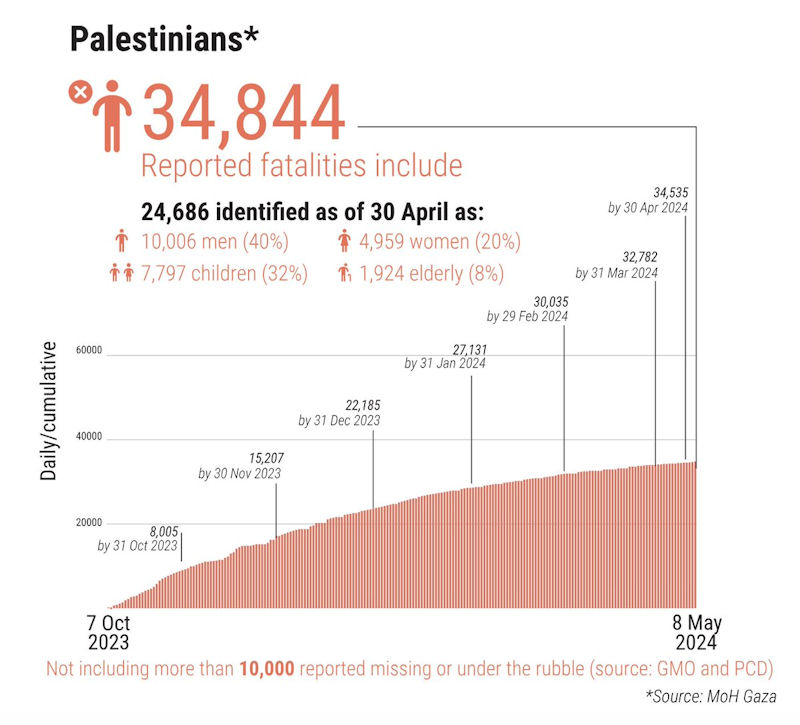
|
NEWSLETTER
|
| Join the GlobalSecurity.org mailing list |
|
|
|

